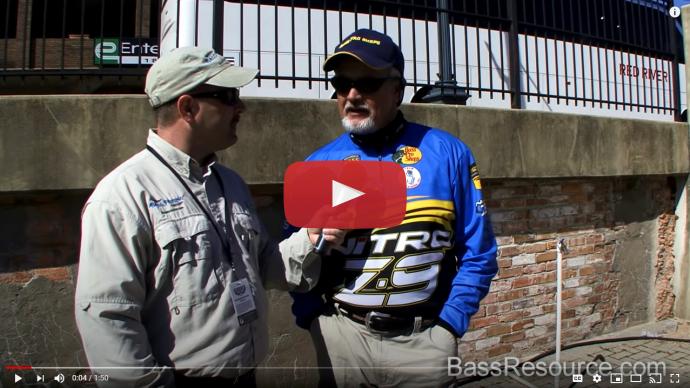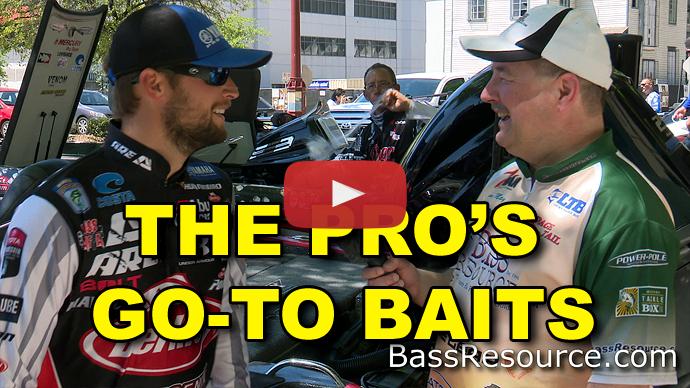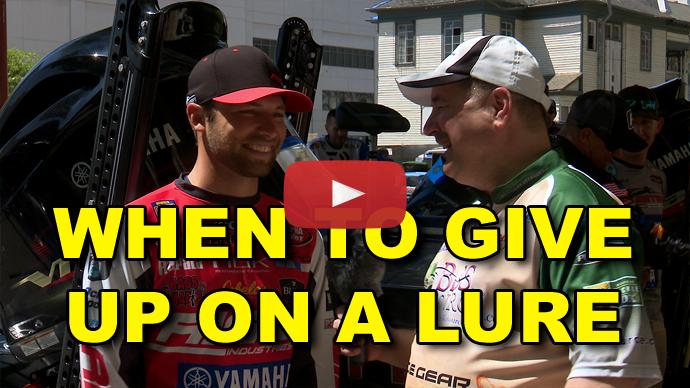Glenn: Hi, I am Glenn May, and I am here with Classic Pro, the guru, Mr. Rick Clunn. Rick, it is a pleasure to have you here today.
Rick Clunn: Thank you.
Glenn: Rick, can you tell me a little bit, just kind of how you got started in bass fishing and how it ended up getting to where you are today?
Rick: Well, you look at it, I have been in it 35 years and it is a fairly long story, so I will try to speed it up, the timeline on it. Actually, I started with my dad, wading down creeks in Oklahoma, fishing for anything--goggle-eyed perch, brim--and my dad liked to bass fish, so that is really where I kind of fell in love with bass fishing.
My very first bass I caught was on a red-and-white Lucky 13 on my dad's rod and reel, and actually, he never allowed me to fish, but the particular day, we had a bunch of relatives over, and he took them out in a boat, and I was standing there at the boat, crying because there was not enough room in the boat, so he handed me his rod and reel with the Lucky 13, and said, "Just fish here around the camp, and I'll come back later, and you can go out with me in the boat," and so I had never caught a bass by then.
I was walking up and down the bank, and I was loving it because I was fishing with my dad's rod and reel, and I was throwing the Lucky 13, but as do most kids, after a while, throwing it out there, I was kind of looking at crawfish, and I heard an explosion, and I looked up just in time to see this green fish with this red-and-white Lucky 13 coming out of the water on his nose. It scared me so bad I did not even reel. I just took off running up the bank.
And I skipped the fish about three feet up on the bank, and he came off, and he started flopping back toward the bank, and I panicked, and I was running, and I dived through there like this linebacker trying to land on a fumbled football, you know. I landed on the fish, and I got him, and again, it was the only fish anybody caught that day, and I am so proud of him.
But I will never forget, and I smelled like that bass, and that smell has stuck with me because I had it all over me. That poor old fish got abused. But still, that is kind of what made me love--all of a sudden. That was really probably the turning point, because before then, I had fished with little baits: minnows, crickets, grasshoppers and earthworms, and all of a sudden, I loved the fact that there is something so just about feeding this fish and fooling him into thinking this piece of red-and-white wood--all of a sudden it became, "Hey, this is neat." You know, he has to eat minnows and crickets, I am really not fooling him, but I fooled him, and so from that point on, I loved casting artificial lures for bass.
Glenn: Well, now that you are at the top level of your game, strategy plays a very important part to that, and a lot to your success. I am just curious, what do you do when you are preparing for a tournament? What kind of strategy goes into that, and does it change from tournament to tournament?
Rick: Well, strategy is everything. Most of these guys are very equipped at developing a strategy, applying it, and executing it, and yet many times, you do that through pre-tournament preparation, through practice, and then through the tournament, and then all of a sudden at the tournament, you still have not done well, even though you executed your strategy perfectly. Basically, what you learn from that is that the most important initial step is having the right strategy, because if I have the wrong strategy, even though I execute it perfectly, it still will not translate into success.
So that really is the ultimate key here is knowing what is the correct strategy. What baits do I need to be fishing? What type of water should I be fishing? Most importantly, you know, I have to be willing to take less bites to catch the right fish, because in the old days, tournament fishing was catching a limit. When I started tournament fishing, B.A.S.S. was a ten-fish limit. You caught a ten-fish limit every day. You did not ever worry about the big fish. Every day in a three-day tournament that you weighed in ten fish, you were going to do fine.
With the five-fish limit nowadays, the quality of the lakes we have, the quality of the anglers, a limit is not good enough anymore. So now, so much of your time has to be to have the strategy to develop a technique that produces the five right bites, and if that means you are only going to get eight bites all day instead of 30 or 35 (because most of us want 30 or 35--that is more fun), you have to be willing to give up that if it means to get 8 right bites. If it means you have to fish a big swimbait, you are not going to get many bites, but when you get one, it is going to be the right bite.
Glenn: Right. Now, for this upcoming season is any of your strategy going to be different from previous years, or are you kind of sticking with your game plan like you have done all along?
Rick: No, any Classic nowadays, you really have to employ a different strategy than back in the old days, because again, when I won my first Classic, it was a 10-fish limit, and like I said, I did not worry a whole lot, even though I caught some big fish during the tournament, and that Classic was 1976, on Lake Guntersville, but still, that was the whole game then. Weigh in 10 fish a day, and that final day, see if you need to make a change. Here if you weigh, there will be guys weigh in five fish a day that will not even fish till the final day because they will not make the cut even though they caught five fish a day.
Glenn: Yes.
Rick: No, your strategy has to be to win, and it means that you have to develop the techniques and use the lures and the presentations that it takes to get the right bites--not get a lot of bites, get the right bites.
Glenn: Right. Now, if you have a bad day on the water during the tournament, how do you maintain that focus to get right back into it the next day?
Rick: You cannot afford to have a bad day. If you have a bad day with this group of guys, it is over.
Glenn: Right.
Rick: You can go out and just have fun, cry in your beer, and what you want. You will be out there going through the motions, but you cannot have a bad day. Forget it. It used to be you might be able to have a bad day. No, you cannot do it anymore, so what you mean by a bad day is relative now. You can have an okay day, and it is more what you are talking about, but let's say you are in 15th place, and you are, let's say, 5 pounds behind. Well, you are still in the race, and now, even though that was not a good day, you are still in the race, and that is really going to be the key to your mindset and what you need to do and the changes you need to make to move yourself up, but a bad day now, you are finished.
Because even though this body of water has the ability to put 25 pounds in the boat any day, which can move you up, that is why a mediocre day can still keep you in the running to win, where a bad day, even if you caught 25 pounds the second day, you are not going to make that final cut, probably.
Glenn: Right. Let me talk a little bit about your sponsors. You have a lot of products out there with your name on it. I was curious, when it comes to those products, how much input do you have in the development and the creation of them.
Rick: It depends on the company--the type of company. With the lures and stuff, for me, with lures and rods and reels, and stuff like that, it is one 100% my input. Now, when you get into boats and the larger items like outboard engines and stuff, it is probably less than 10 or 20% input into that type of stuff. Most boats nowadays have all the requirements so that years ago, you would have had more input, but most boat changes nowadays, we might have given input back let's say 30 years ago, "Hey live wells and rod boxes need to be this way," and that is the kind of input we get, but that is pretty well now there.
Now the only things that are changed are cosmetics and a little bit on the hull designs and stuff, and most of the time, that is somebody else doing that. We might say, "Yes, we want the boat to run like this and get on plane this fast," but that is about it.
Glenn: Well, how about the crankbaits that you have, your signature series?
Rick: Yes, that is pretty much all mine. I mean, I put all the design into that, from how it should run to the colors to the type of hooks that are on it, right down. I mean, 100% of that. I give them the original ideals. They send me prototypes. I critique the prototypes. I send them back until it is the way I want it.
Lucky Craft probably is the best company I have ever worked with because even historically, in the past, the companies I worked with, the best I could get was maybe 80 or 90% of what I really wanted, but I never got 100% until Lucky Craft, and with them, I actually end up getting more than I want. The guy is a genius. The bait catches a lot of fish. It helps me make my living, but it is so satisfying now to work with a company where if you have this ideal, all of a sudden, you can put the ideal on paper, and all of a sudden, you can fish it, and it is exactly what you wanted.
Glenn: How long does that take for that going back and forth process before it finally comes down exactly what you wanted?
Rick: Usually around six months, if it is a brand new lure or bait.
Glenn: Really?
Rick: Yes, around six months to get from the original conception to actually being able to manufacture it.
Glenn: Yeah. Talk a little bit about your tin boat that you are using here out on the Classic.
Rick: Well, that is a good one, because the one thing that I am doing a little different this year's classic is I am actually fishing out of an 18-foot aluminum boat. It is a Tournament V18 that Tracker makes. I like the V-bottom even though it will not go quite a shallow as a flat-bottom, but in the V-bottom--I grew up fishing Toledo Bend and Rayburn when they were full of stumps--and the narrow light V-bottom aluminum boats like that go through the stumps so much easier. They are so fishable--a lot more fishable than, say, my big boat.
Another thing I kind of like about that--I actually like these 18-foot boats. I have caught as many fish, if not more, out of an 18-foot with a 150-horse engine on it than I have out of these big 20-, 21- or 22-foot boats with 250-horse engines, and I think one of the biggest mistakes we have done kind of unintentionally in this sport is we have kind of over the years--us, the fishermen, the tournament organizations and the media--have kind of given the public the impression that you cannot be a good fisherman unless you own a $50,000 boat, and that is just not true, and so like I said earlier, I have caught just as many out of this size boat I am going to be fishing in the Classic as I have one of the big boats, and I am fishing it at the Classic.
The Red River is perfect for an aluminum boat, but I am actually going to fish it probably at Toledo Bend in the Open, and maybe even at Amistad, so I kind of am trying to erase a little bit of the wrong message that we are sending to the young fans and people that you have to have--I guess so many young kids call me and say, "Do you have to have a 20-foot boat with the big engine on it?" and they think they do, and I think that we are to blame for that. We have given them, again, that message that you cannot be a good fisherman if you do not have a big boat.
Glenn: Right. Well, thank you very much, Rick. I appreciate your being on.
Rick: Thank you.
Glenn: I hope you get a fifth one.
Rick: Thank you.
Glenn: All right.



